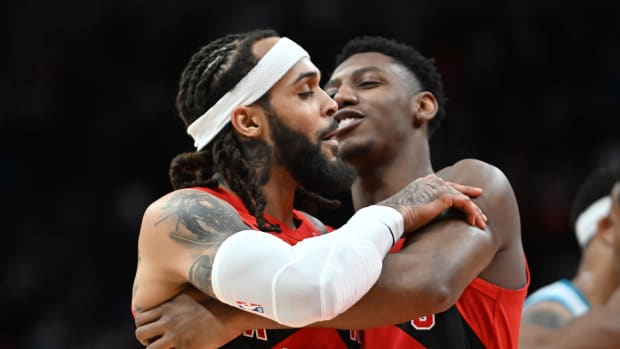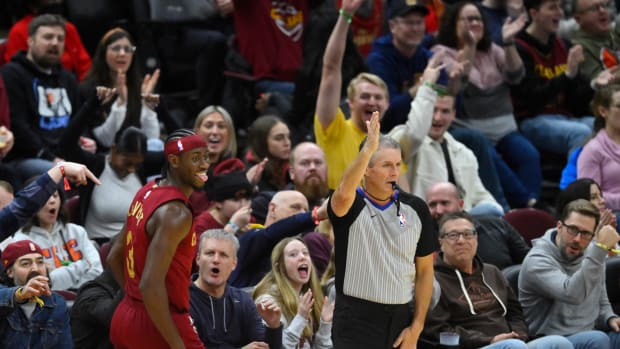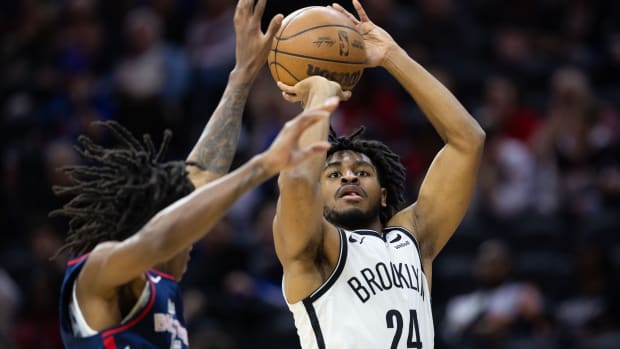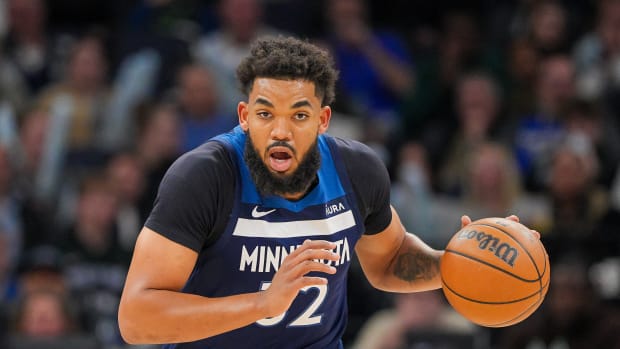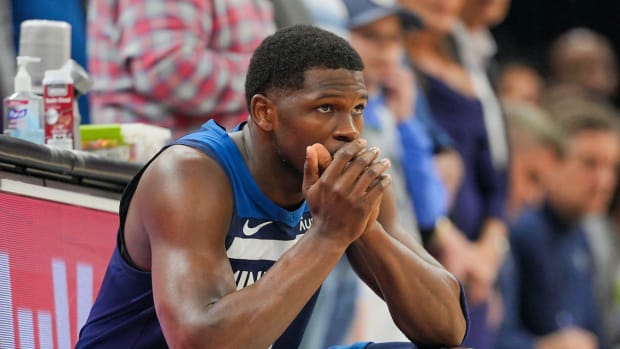The KD Text: Is Draymond Guilty Of Tampering?
Is Kevin Durant a Golden State Warrior because of tampering? The short answer is “no,” but texts exchanged between Draymond Green and Durant in the minutes following the Warriors loss to the Cleveland Cavaliers in Game 7 of the 2016 NBA Finals reveal the uneasy relationship between players’ virtual communications and longstanding NBA rules.
Contents of Green’s texts are revealed in Lee Jenkins’s Sports Illustrated cover story, ‘I’m Ready’: The Text That Started the Warriors Dynasty. Jenkins describes how a dejected Green texted Durant, whose Oklahoma City Thunder had been defeated by Green’s Warriors in the Western Conference finals a few weeks earlier. The texts were intended to recruit Durant, who was set to become a free agent on July 1. Durant, who responded favorably to Green, was still under contract with the Thunder at the time and would remain so for another 12 days.
'I'm Ready': The Text That Started The Warriors' Dynasty
The following excerpts from Jenkins’s story detail the players’ texts and their potential impact on Durant’s interest in the Warriors:
And so, at that locker, in that uniform, less than an hour after the most excruciating loss of his life, Green punched up Kevin Durant’s number. “See what we’re missing,” Green says, recounting the text message he sent Durant. “We need you. Make it happen.” Green had been courting Durant for months, but this was his strongest pitch yet, delivered at the most dramatic juncture. “Right after you lose Game 7,” Green says, “shows you’re serious.”
Green stared at his phone, waiting for a reply. Up to that point the Thunder were confident they would re‑sign Durant when he became an unrestricted free agent on July 1. One Oklahoma City official kept in touch with him through June and was encouraged by his upbeat tone. “The day Golden State lost, everything changed,” the official says. “The phone calls, the text messages, they were more distant.” The Warriors would have to endure a summer’s worth of mortifying memes—punishment for squandering a 3–1 Finals lead—but by the time Green peeled off his home whites and hit the showers, he could sense that his squad would laugh last. Durant’s response flashed across the screen: "I'm ready. Let's do this."
Durant would sign with the Warriors on July 4, 2016. It’s possible that Green’s texts played no role in Durant’s decision. By most accounts, the Warriors appealed to Durant for a variety of reasons, including because the Warriors, with Durant, were poised to topple LeBron James and the Cavaliers.
Then again, based on remarks made by an unnamed Thunder official to Jenkins, Durant began to distance himself from Thunder officials at around the time the Warriors lost to the Cavaliers and thus around the time Green texted Durant. This timing suggests that Green’s texts may have proved influential in Durant’s decision-making.
What is tampering?
Tampering is a legal concept. In the NBA, it refers to a team or its representative attempting to persuade a player, coach, trainer, general manager or any other person who is under contract with another team to join the tampering team. An owner, general manager, coach, scout or player can tamper and be punished for it. Allegations of tampering must be supported by evidence and are reviewed by the commissioner.
Tampering has been in problem in the NBA for decades. In 1995, the New York Knicks filed a tampering complaint with then-commissioner David Stern in response to evidence that Miami Heat executives were trying to lure Pat Riley, who was under contract with the Knicks, to coach the Heat. Stern presided over an arbitration-like hearing, which featured witnesses from the Heat and Knicks and accompanying written and digital evidence. The teams eventually reached a settlement, with the Heat agreeing to transfer their 1996 first–round pick along with $1 million to the Knicks.
Dubs Dynasty? The Warriors Are Just Getting Started
The NBA regards tampering as harmful to competition since it undermines teams’ commitment to operate under a certain set of business rules. One such rule is to respect existing contractual relationships between teams, coaches and players. As a result, teams are forbidden from making contact with coaches and players who are under contract with other teams. Teams are also barred from articulating statements, be they spoken or written, that are intended to entice coaches and players who are contractually bound to other franchises.
Think of an NBA where general managers reached out to players on other teams throughout the year. Imagine Danny Ainge calling Gordon Hayward all spring to recruit him or Magic Johnson calling Paul George to do the same. The Utah Jazz and Indiana Pacers would clearly resent those calls. Perhaps they would retaliate by making recruitment pitches to players under contract with the Boston Celtics and Los Angeles Lakers, respectively. This environment could prove disruptive and distracting. It might also place recruited players in an awkward position when they play against teams that are simultaneously recruiting them.
The NBA’s anti-tampering provision is found in Article 35 of the league constitution. It governs owners, team executives and players. Article 35 dictates that upon a finding of tampering, the commissioner can issue a range of punishments including fines, suspensions, forfeitures of draft picks and transfers of draft picks from the tampering team to the victimized team. As to players who tamper, the commissioner can suspend the player and fine him up to $50,000.
Why does the NBA try to stop it?
In recent years, the NBA has punished several teams and owners for tampering. In 2013, for example, the league fined the Atlanta Hawks because a staff member mailed an official letter to season ticketholders in which the letter raised the possibility of the Hawks signing Chris Paul and Dwight Howard. Both of those players were under contract with other teams. In that same year, the NBA fined the Sacramento Kings when its then-head coach, Michael Malone, suggested that Paul, a Los Angeles Clipper, would “look pretty good in a Sacramento Kings uniform.” Mark Cuban has also run afoul of the NBA’s anti-tampering rule. In 2010, the NBA fined him $100,000 merely because he publicly expressed interest in the Mavericks signing LeBron James if he became available.
Tampering shouldn’t be confused with oral promises to potential draft picks. To illustrate, Kansas forward Josh Jackson unexpectedly canceled a workout with the Celtics last week while Ainge, head coach Brad Stevens and assistant GM Mike Zarren were flying from Boston to Sacramento to meet with him and his agent, B.J. Armstrong. The trio hoped to evaluate Jackson in person before Thursday’s NBA draft, in which the Celtics had the third overall pick. There is speculation that Jackson bailed on the Celtics after receiving a promise from Phoenix Suns GM Ryan McDonough that the Suns would draft him with the fourth overall pick. Although Jackson will earn less with the Suns as the fourth overall pick than he would have earned on the Celtics as the third overall pick, he will likely receive much more playing time on the Suns. This is not tampering since Jackson was not yet a member of any NBA team and the Celtics, who selected Duke forward Jayson Tatum, could have still drafted Jackson with the third overall pick.
While tampering in the NBA is frowned upon, the same kind of underlying conduct is often viewed more favorably in other industries. Have you ever been recruited by a competitor of your employer? If you have, you probably didn’t view the recruitment as “tampering.” Instead, you likely regarded the outreach as simply a sign that you were good at your job and that others had noticed.
The law usually agrees with you: in many instances, antitrust law ensures that competitors can’t conspire to not compete for employees and potential employees. Such “conspiracies” can lower potential salaries and the free movement of labor.
Trade Grades: Wolves Fleece Bulls In Jimmy Butler Blockbuster
But it works differently in the four major pro sports leagues. They’re comprised of independently owned franchises that, by design, conspire to ensure that each team has a legitimate chance to succeed. Clear limits on how and when teams can compete with each other for coaches and players are part of that design.
Take the NBA draft and rookie wage scale and notice how they overtly limit competition for elite amateur players. In requiring that a drafted player can only sign with the team that selects him and only for a salary stipulated by the wage scale, the draft and wage scale prevent amateur players from both signing with preferred teams and inducing multiple teams to offer competing bids for their services.
Why shouldn’t the Lakers and Clippers enter into a bidding war for Lonzo Ball’s services? Why can’t Markelle Fultz sign with his hometown Washington Wizards?
In response, the NBA would insist that an NBA without a draft would be a league where some teams, because of their location and reputation, struggle year-after-year in recruiting elite amateur players. The league as a whole would suffer as a result. Further, the draft and wage scale are lawful because of consent: teams agree to these policies in the league constitution and players agree to them in the collective bargaining agreement.
The same logic holds true for the NBA’s anti-tampering rule: even though it prevents teams from competing and prevents players from using another team’s recruitment as bargaining leverage, it is consistent with the league’s business model and contractually accepted by the relevant parties.
NBA players are normally not punished for tampering
While the league has fined teams and owners for violating the anti-tampering rule, it has usually shied away from punishing players.
One exception occurred in 1999 when the San Antonio Spurs accused Chicago Bulls center Will Perdue of tampering. Perdue, who played for the Spurs from 1995 to 1999, publicly suggested that Tim Duncan might not re-sign with the Spurs. “Tim Duncan is not married to San Antonio by any means,” Perdue said at the time. "He's made that very clear." The NBA admonished Perdue for his remarks. The league reasoned that his comments could have been construed as an attempt to induce Duncan to sign with the Bulls.
Otherwise, however, the NBA has permitted or at least acquiesced to potential recruitment communications between players who are under contract with different teams.
Dan Gilbert Just Gave LeBron James A Cover Story To Leave Cavs In 2018
A well-known example is how LeBron James and Chris Bosh joined Dwayne Wade on the Miami Heat in 2010. The players reportedly spoke for years about playing together before the opportunity with the Heat arose. Put another way, they recruited one other while they were under contract with different teams. The NBA took no action.
Now-a-days players seem to embrace the role of recruiter in spite of the league’s anti-tampering rule. For instance, while at All-Star Weekend this past February, Boston Celtics point guard Isaiah Thomas told The Boston Globe, “I definitely did some recruiting. But I’m not going to tell y’all who though. I was talking to a lot of guys, a few guys. And they were talking to me back.”
Keep in mind, the players Thomas spoke with were all under contract with other teams.
The NBA likely tolerates players recruiting one another because of the impossibility of trying to stop it. Players can do so in person or through virtual communications like texts and social media posts. They also recruit—or “tamper”—on their own and as part of the fraternity of NBA players. For the league to attempt to investigate player conversations likely would be both futile and an invasion of privacy.
Trade Grades: Lakers Ship D'Angelo Russell To Nets In Salary Dump
It’s possible, however, that if a player acts at the behest of an owner or general manager to recruit a player who is under contract with another team, the NBA might be more inclined to find tampering. Hypothetically, if Green had texted Durant not out of personal frustration over losing to the Cavs but because a Warriors official had encouraged him to do so, the NBA would be more inclined to see tampering.
But that’s not what happened. So the next time you hear a player say, “I definitely did some recruiting” before free agency starts, he might as well have said, “I definitely did some tampering.” Either way, he probably won’t get in trouble.
Michael McCann, SI's legal analyst, provides legal and business analysis for The Crossover. He is also an attorney and a tenured law professor at the University of New Hampshire School of Law.
































